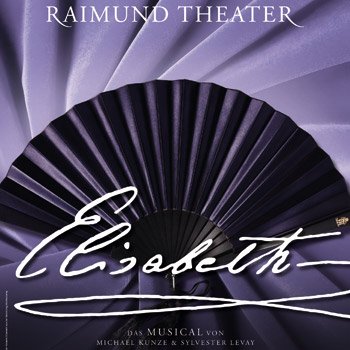I summarize information of musical Elisabeth such as data-base for introducing.

Today I will talk about musical Elisabeth. I have been watched this show in 2013, 2015. 2013 is 2nd version of Korea and 2015 is 3rd version. The reason why I introduce this is Elisabeth is my favorite musical. Because numbers are very beautiful and grand and topic is related to “freedom” which is not an average man but a royal family. So in this musical, the message that freedom gives to us is special and unique.
▶ Introduction
This musical is a Viennese, German-language musical commissoined by the Vereinigte Bühnen Wien(VBW), with book/lyrics by Michael Kunze and music by Sylvester Levay. It portrays the life and death of Empress Elisabeth of Australia, wife of Emperor Franz Joseph.
This musical is very popular among other musicals in Korea. This situation is almost same to other countries.
Especially, Autrian loves her so there are many her status, museum. She lived Schönbrunn Palace(Schloss Schönbrunn).

▶ Place in which Elisabeth lived

Schönbrunn Palace is a former imperial summer residence located in Vienna, Austria. The 1,441-room Baroque palace is one of the most important architectural, cultural, and historical monuments in the country. Since the mid-1950s it has been a major tourist attraction. The history of the palace and its vast gardens spans over 300 years, reflecting the changing tastes, interests, and aspirations of successive Habsbrug monarchs.
And do you know that? in this palace, there is a room in which Mozart played. As you see, palace is so beautiful and grand.
Add) what is the Baroque architecture's feature?

Baroque architecture is the building style of the Baroque era, begun in late 16th-century Italy, that took the Roman vocabulary of Renaissance architecture and used it in a new rhetorical and theatrical fashion, often to express the triumph of the Catholic Church. It was characterized by new explorations of form, light and shadow, and dramatic intensity.
▶ Feature

Individually, I think the best point of musical is director portrays death to person. Hence, he changes abstract to personification. Through this, Elisabeth talks and sings with death(Tord) and we can feel death's feeling. Moreover, we become know relationship between Elisabeth and Death.
I will talk this later(next post). Because I think we should focus and think Death's feeling. Originally, many people think does not have a feeling and fair to everyone.
▶ Principal characters
There are many characters but I introduce only a few principle characters.
(1) Elisabeth : the Empress of Austria and later Queen of Hungary
(2) Death : the personification
(3) Luigi Lucheni : an anarchist and Elisabeth's assassin. The narrator of the play
(4) Franz Joseph, the Emperor of Austria and later King of Hungary
(5) Archduchess Sophie, Franz Joseph's autocratic mother
(6) Rudolf, Elisabeth and Franz Joseph's son
▶ Song list [In musical, song is called “number”]
Additional songs have been added for some productions of Elisabeth that are not featured in all productions. Also the order of songs is often switched, which is the most noticeable between the German and the Viennese versions. This song list and order, with titles in English, is based upon the original Vienna production except where noted.
< Act 1 >
• Prologue (Prolog) - Judge, Lucheni, Death
• Like You (Wie du) - Elisabeth, Max
• Lovely to Have You All Here - (Schön, euch alle zu seh'n) Ludovika, Hélène, Family
• No Coming Without Going (Kein Kommen ohne Geh'n) - Death (Hungarian, Japanese, 2012 Vienna productions only (sung by Death and Elisabeth in 2012 Vienna production))
• Black Prince (Schwarzer Prinz) - Elisabeth (originally a direct reprise of Like You, rewritten for the Dutch premiere and subsequent productions, cut in 2012 Vienna production)
• To Each He Gives His Own (Jedem gibt er das Seine) - Sophie, Franz-Joseph, the Court
• Things Never Happen As Planned (So wie man plant und denkt...) - Lucheni, Sophie, Hélène, Elisabeth, Franz-Joseph
•Nothing is Difficult Any More (Nichts ist schwer) - Franz-Joseph, Elisabeth
• All Questions Have Been Asked (Alle Fragen sind gestellt) - Wedding Chorus (and Death in the Takarazuka production)
• She Doesn't Fit (Sie passt nicht) - Sophie, Max, Wedding Guests
• The Last Dance (Der letzte Tanz) - Death
• An Empress Must Shine (Eine Kaiserin muss glänzen) - Sophie, Countess Esterházy, Ladies-in-Waiting
• I Belong to Me (Ich Gehör Nur Mir) - Elisabeth
• The First Four Years (Die Ersten Vier Jahre) - Lucheni, Elisabeth, Sophie, Ladies-in-Waiting, Franz-Joseph, The Court, Hungarians (finale completely rewritten for the Takarazuka production and partially for the Hungarian version.)
• The Shadows Grow Longer (Die Schatten werden länger) (Preview) - Death
• The Cheerful Apocalypse (Die fröhliche Apokalypse) - Lucheni, coffeehouse patrons
• Child or Not (Kind oder nicht) - Sophie, Countess Esterházy, Young Rudolf (appears from the German premiere and subsequent productions, except the Takarazuka production)
• Elisabeth, Open Up My Angel (Elisabeth, mach auf mein Engel) - Franz-Joseph, Elisabeth, Death
• Milk (Milch) - Lucheni, the Poor (and Death in the Takarazuka production)
•Beauty Care (Schönheitspflege) - Countess Esterházy, Ladies-in-Waiting
• I Just Want to Tell You (Ich will dir nur sagen) (I Belong to Me Reprise) - Franz-Joseph, Elisabeth, Death (originally only Franz-Joseph and Elisabeth in the original Vienna and Hungarian productions)
< Act 2 >
• Kitsch (Kitsch) - Lucheni
• Éljen (which is Hungarian for "long live...") (Éljen) - Hungarian Crowds, Lucheni (omitted in Stage Entertainment productions)
• When I Want to Dance (Wenn ich tanzen will) - Death, Elisabeth (written for the German premiere and appears in subsequent productions, sans the Hungarian staging)
• Mama, Where Are You? (Mama, wo bist du?) - Young Rudolf, Death
• Mama, Where Are You? (reprise) (Mama, wo bist du reprise) - Young Rudolf, Death (Original Dutch production only; the scene was inserted into the gap made by moving the earlier song into act one)
• She Is Insane (Sie ist verrückt) - Elisabeth, Miss Windisch
• Nothing, Nothing, Nothing at All (Nichts, nichts, gar nichts) - Elisabeth (originally a dance-sequence with Elisabeth as Titania from A Midsummer Night's Dream, missing the second half of the song in the Takarazuka production)
• I Belong To Me (Ich Gehör Nur Mir reprise) - Elisabeth (Takarazuka productions only)
• Us or Her (Wir oder sie) - Sophie, The Court
• Don't Play the Prude (Nur kein Genieren) - Madame Wolf, Lucheni, Whores
• The Last Chance (Or 'The Malady') (Die letzte Chance (Maladie)) - Death, Elisabeth
• Between Dream and Reality (Zwischen Traum und Wirklichkeit) - Elisabeth (Toho Japanese productions only, also recorded for the Stuttgart production cast recording, though not utilised in the actual show)
• Argument between Mother and Son - Franz Josef & Sophie (Streit Mutter und Sohn) (proceeds Sophie's solo "Bellaira")
• Bellaria (Bellaria) - Sophie (Primarily appeared in Hungarian and Japanese productions starting in 1996; Has been present in all productions since then, except for the Takarazuka production)
The Restless Years (Die rastlosen Jahre) - Franz-Joseph, The Court, Ladies-in-Waiting
• Hunt (Jagd) - A sequence referencing Elisabeth's hunting trips in Europe in the original Viennese production (deleted in all but the Hungarian production)
• The Shadows Grow Longer (Die Schatten werden länger (Reprise)) - Death, Rudolf
Argument Between Father and Son (Streit Vater & Sohn) - Rudolf, Franz Joseph (first seen in the Dutch and Essen productions, then inserted into the Viennese revival and subsequent German productions)
• Hate (Hass) - Anti-Semites & Lucheni (cut from the Takarazuka productions due to controversial content)
• Conspiracy (Verschwörung) - Rudolf, Hungarian Nationalists (does not appear in the Vienna production; expanded for the Takarazuka version)
• Like You (Wie du (Reprise)) - Elisabeth, Max's Ghost (does not appear in the Takarazuka production)
• If I Were Your Mirror (Wenn ich dein Spiegel wär) - Rudolf, Elisabeth
• The Mayerling Waltz (Mayerling-Walzer) - Rudolf, Death, Mary Vetsera (orchestrations expanded in the Takarazuka production since the Star Troupe 1996 performance and used for current productions)
• Rudolf, Where Are You? (Dirge) (Rudolf, wo bist du? (Totenklage)) - Elisabeth (a duet with Sophie's Ghost in the Dutch and Hungarian productions)
• No Coming Without Going (Kein Kommen ohne Geh'n Reprise) - Death (Takarazuka productions only)
• My New Assortment (Mein neues Sortiment) (Kitsch reprise) - Lucheni
• Ships in the Night (Boote in der Nacht) - Elisabeth, Franz-Joseph
• On the Deck of the Sinking World (Am Deck der sinkenden Welt) - Lucheni, Death, Franz-Joseph, the Habsburgs (Missing first half of the song in the Takarazuka stagings)
• The Veil Descends (Der Schleier fällt) - Elisabeth, Death
• Closing Music (Schlussapplaus) - Instrumental (Length and assortment of themes vary from production to production)
▶ Elisabeth’s son : Rudolf, Crown Prince of Austria
I will introduce to you Rudolf. Because his life is also produced to musical.

For the friend and patron of Beethoven, see Archduke Rudlof of Austria(1788-1831). Rudolf(21 August 1858-30 Janauary 1889), who was Archduke of Austria and Crown Prince of Austria-Hungary, was the only son of Emperor Franz Joseph Ⅰand heir apparent to the Austo-Hungarian Empire from birth. In 1889, he died in a suicide pact with his mistress, Baroness Mnary Vetsera, at the Mayerling hunting lodge. The ensuing scandal made international headlines. He was named after the first Habsburg King of Germany, Rudolf Ⅰ, who assumed the throne in 1273.
Moreover, let’s talk about impact of Rudolf’s death. Rudolf's death plunged his mother into despair. She wore black or pearl grey, the colours of mourning, for the rest of her life and spent more and more time away from the imperial court in Vienna. Empress Elisabeth was murdered while abroad in Geneva in Switzerland in 1898 by an Italian anarchist, Luigi Lucheni. Politically, Rudolf's death left Franz Joseph without a direct male heir. Franz-Joseph's younger brother, Archduke Karl Ludwig, was next in line to the Austro-Hungarian throne, though it was falsely reported that he had renounced his succession rights. In any case, his death in 1896 from typhoid made his eldest son, Archduke Franz Ferdinand, the new heir presumptive. In 1914, Franz Ferdinand's assassination precipitated World War I. Emperor Franz-Joseph died in November 1916 and was succeeded by his grandnephew, Karl. The socialist revolution in Vienna in early November 1918 saw the end of the Empire and the exile of Karl and his immediate family.
▶ Who is the best Elisabeth?

Pia Douwes (born 5 August 1964) is a Dutch actress in musical theatre in Europe. She is best known for having created the title role in the German-language musical Elisabeth.
Next time, I will write Elisabeth’s review of philosophical view.
Thank you for reading.
Hola @elisabethkim09, upv0t3
Este es un servicio gratuito para nuevos usuarios de steemit, para apoyarlos y motivarlos a seguir generando contenido de valor para la comunidad.
<3 Este es un corazón, o un helado, tu eliges .
: )
N0. R4ND0M:
6203 8012 2994 5082
8443 5085 2858 2710
2399 8262 7675 8160
6711 3556 8504 7396
Congratulations @elisabethkim09! You have received a personal award!
Click on the badge to view your Board of Honor.
Do not miss the last post from @steemitboard:
SteemitBoard World Cup Contest - Home stretch to the finals. Do not miss them!
Participate in the SteemitBoard World Cup Contest!
Collect World Cup badges and win free SBD
Support the Gold Sponsors of the contest: @good-karma and @lukestokes
Congratulations @elisabethkim09! You received a personal award!
You can view your badges on your Steem Board and compare to others on the Steem Ranking
Vote for @Steemitboard as a witness to get one more award and increased upvotes!